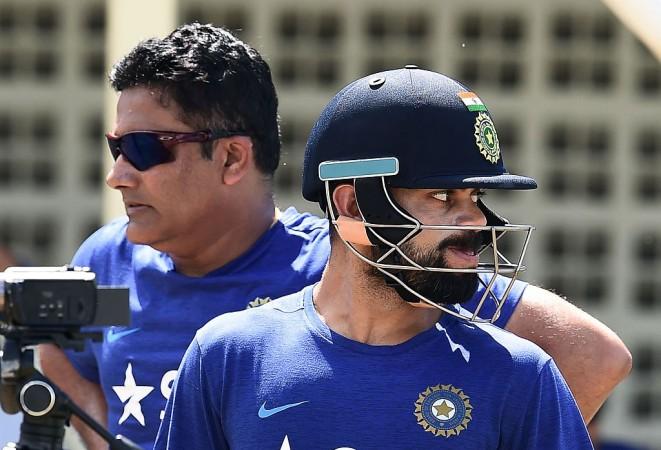
India's Olympic gold medallist Abhinav Bindra had a disguised message for Indian cricket captain Virat Kohli after Anil Kumble decided to step down as the coach of the national team. Bindra said he also "hated" his coach but still continued with him for 20 years. "He always told things I did not want to hear," Bindra tweeted.
Bindra's message conveyed the tale which unfolded between Kumble and Kohli's Team India.
Also read: Cricket's loss is hockey's gain: How the stick is matching the bat's power in India again
Kumble clearly belongs to another era of cricket, the era when the coach-player relation was more like a guardian and student. In those days, an Arjuna Ranatunga was more of a father figure to his team, especially the likes of talents like Muttaiah Muralidharan and Sanath Jayasuriya. In the Indian sides, too, Mohammed Azharuddin was more like an elder brother to Kumble when he was young in the circuit. In the later years, Sourav Ganguly had emerged as a universal 'dada' for all his teammates – senior or junior.
The day of guardians are gone
That culture is no more a reality. Whether it the captain or the coach, the 'seniority' factor has evaporated as the game has become more decentralised and democratised. The likes of Kohlis, Shikhar Dhawans and Rohit Sharmas have become perhaps bigger than the game itself and to be frank, they do not require a coach at all. There is very little chance of a player, who belongs to the yesteryears, succeeding at the helm of the current lot for whom cricket is more success than a struggle.
The self-pride and importance is so mammoth, thanks to the way cricket has changed, that these players do not need any coach for mentoring or guidance. They have their bats to do all the talking. The universal decline in the bowling standards in cricket also makes it easier for a player to make his presence felt easily. The coach is redundant and hence he doesn't need to talk to show what should be done to survive on the wicket.
Kumble is from an era when India still were strugglers; in Kohli's times, India are a superpower in cricket
Kumble belongs to an era when Indian cricket was still in a phase of struggle. Given the quality of teams like Australia, South Africa, Pakistan and Sri Lanka then, it was not easy for India to accomplish feats easily. Kohli, on the other hand, belongs to an era when India is an established superpower in cricket.
The Indian captain himself has been part of a World Cup-winning team, something which Kumble has missed despite being the most successful bowler for the country. The learning curves have been so much different thus to expect the two minds to think alike is next to daydreaming.
Cultural incompatibility
Cultural incompatibility is perhaps another factor which undid the Kumble-Kohli equation. And it is not the first time that such thing has happened with an Indian coach. We have seen how Indian cricketers had fallout with Greg Chappell, a hard taskmaster from Australia. The reason was mainly cultural. Chappell's work ethics clearly didn't suit the Indians and they found it humiliating. But when the Indian players fail to handle an Indian coach, then what could be the explanation?
When it comes to Kumble and Kohli, the two originate from two completely different cultural milieu of the country and that has a clear bearing on things. Given Kohli's attitude and current stature, it is very unlikely that he would care for anybody, may be except Sachin Tendulkar. But is that really a way to function as the leader of a national team?
Neither Kohli nor Kumble is at fault; it's the generation
On the face of it, Kohli looks to be the culprit in the Kumble ouster episode. But having said that, he belongs to a generation which rules the world today – a norm more than the exception. No amount of hierarchical approach can convince this generation at work and it can only be won as a friend. Kumble, reports said, was upset with the loss to Pakistan in the Champions Trophy final and even scolded the players. In this age and with this generation, the headmaster's skill is obsolete.
It will be interesting to see who becomes India's next coach and how long does he survives in the post, especially if he is also as big an achiever like Jumbo. Kumble, after all, was just a generation senior than the current lot but yet could not survive for long, irrespective of the team's decent performance on the field.
For Kumble, failing to accompany the team to the West Indies was quite an irony. It was in the same Caribbeans 12 years ago that the former captain had bowled out the iconic Brian Lara after taking the field with broken jaws, a feat which is still remembered with respect. But even though Kumble could hold the ball in his hand despite the pain, he failed to hold the mirror in front of the team for self-improvement.
Neither Kohli nor Kumble is at fault. May be the generation gap is too huge to bridge.














